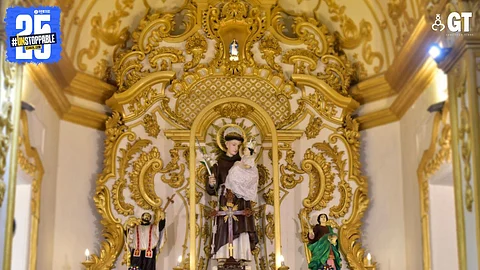

In Goa, the Feast of St Anthony of Padua isn’t just a day on the liturgical calendar of the church; it’s a heartfelt celebration of faith that transcends generations, geography and even religious boundaries.
Observed on June 13 annually, it draws thousands of faithful to the saint, known the world over as the miraculous finder of lost things.
DEEP DEVOTION
St Anthony, a Portuguese priest and Franciscan friar, is revered not just in his homeland and in Brazil — where he is the patron saint — but across Goa, where devotion to him is widespread and enduring.
Traditionally shown holding a book in one hand and the Infant Jesus in the other, he is also known as the patron of pregnant women, elderly people, horses and of course, lost articles.
In Goa, his name is invoked in homes and churches, alike. A familiar piece of advice, “Say a novena to St Anthony” is often heard when someone misplaces something important or is hoping for a wish to come true.
Former parish priest of Panjim, Fr Walter de Sa, notes that St Anthony is one of the most-loved saints in Goa, “My parents had great faith in him, and passed it on to me. The saint is known as advogado das causas perdidas — the advocate of lost causes, and is highly popular, regardless of religion or creed.”
Across Goa, many parishes and chapels observe a 13-day 'novena', known as trezena, in the the days leading up to his feast.
“Churches where the trezena is being held are often packed beyond capacity,” says Fr Walter. One such parish is the historic St Anthony’s Church in Siolim, where the feast is celebrated every year.
The saint is known as 'advogado das causas perdidas' — the advocate of lost causes, and is highly popular, regardless of religion or creed.
Fr Walter de Sa, former parish priest, Mary Immaculate Church, Panjim
THE FAMOUS CHURCH IN SIOLIM
St Anthony's Church, in Siolim, has a story of its own. “As a child, my grandmother told me about some sailors who were caught in a storm at sea, and prayed to St Anthony to save them,” shares Gletta Mascarenhas, a longtime parishioner of Siolim.
She adds, “When the sailors reached the shores of Siolim safely, they decided to build a church in honour of the saint. But, every time they tried to get on with the construction work, a snake would hamper the work, until one sailor suggested placing the saint’s statue there. And, that stopped the disturbances! The next day, the snake was found suspended by a rope from St Anthony’s statue.”
Consequently, the statue at the church in Siolim is uniquely portrayed with St Anthony holding a serpent bound in rope — a depiction not found elsewhere in the world, and which draws both devotees and the curious.
Statues of the saint can also be found in just about all Catholic homes across Goa. “There were times I lost valuable things, and every time I prayed to him and lit candles, I found them,” says a resident of Panjim. “We celebrate the feast at home every year with the recitation of the rosary and a litany.”
NAMED AFTER THE SAINT
Devotion to this saint often begins early in life and lasts a lifetime. Anthony D’Souza, from Chandor, was named after the saint and has never missed a trezena or feast of St Anthony.
“He’s associated with miracles. Couples hoping for a child would pray to him and name the child 'Anthony' as a sign of gratitude.”
For some, the connection to St Anthony is personal in a different way. Mellissa Pacheco, born on the morning of the saint’s feast day, was christened ‘Aniet’.
“My parents and grandparents always said that St Anthony would help us find whatever items we had lost — and he always did,” she says. “I grew up attending novenas (trezenas) and feast masses at St Anthony’s Church in Siolim. Now, after marriage, I go to the chapel in Chinchinim instead.”
The statue at the church in Siolim is uniquely portrayed with St Anthony holding a serpent bound in rope — a depiction not found elsewhere in the world.
“It is said that when the body of the saint was exhumed, his tongue was found to be fresh and red, because he never stopped preaching about Christ. In some places, they even celebrate the feast of the saint's tongue,” says Fr Walter.
And so, while Goa celebrates the Feast of St Anthony, his presence goes far beyond the festivities.
For Goans across villages and towns, he is a daily refuge, a quiet comfort in homes, chapels and roadside shrines, a gentle companion in times of need and a whispered prayer in moments of uncertainty.